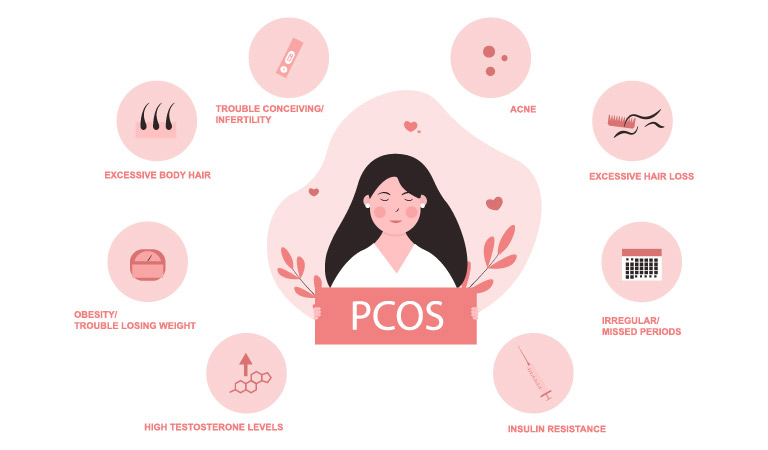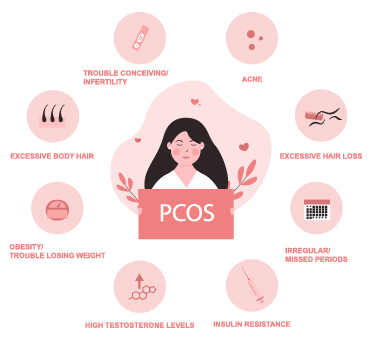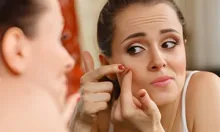Causes of PCOS - Understanding Polycystic Ovary Syndrome
Polycystic Ovary Syndrome (PCOS) is a common endocrine disorder that affects 7-10% of women. While PCOS causes are not definite, it is said to be a condition that is driven by hormones, mainly the male hormone. It is stated by the National Center for Biotechnology Information that considerable evidence from human and animal studies currently supports the hypothesis that excess androgens, acting through the AR (Androgen Receptor), play a key role in the development of polycystic ovary syndrome (PCOS).
Below are some common causes of PCOS


Polycystic Ovary Syndrome (PCOS) is a common hormonal disorder affecting women of reproductive age. It is characterized by the presence of multiple cysts in the ovaries and an imbalance of hormones including insulin, androgens, and estrogen. PCOS causes a range of symptoms including irregular menstrual cycles, infertility, and an increased risk of developing other health conditions. The exact causes of PCOS are unknown, but it is believed to be a combination of genetic and environmental factors. Some of the most common PCOS causes include insulin resistance, inflammation, and an overproduction of androgens. PCOS can also lead to an increased risk of developing other health conditions such as type 2 diabetes, cardiovascular disease, and endometrial cancer. Women with PCOS need to receive proper diagnosis and treatment to manage their symptoms and reduce their risk of developing these serious health conditions.
Rare PCOS Causes
Polycystic Ovary Syndrome (PCOS) is a common hormonal disorder that affects women of reproductive age. While the exact cause of PCOS is unknown, several known factors contribute to its development. The most common causes of PCOS include insulin resistance, high levels of androgens (male hormones), and an imbalance of reproductive hormones. However, some rare causes of PCOS are not as well known. These rare PCOS causes include thyroid disorders, congenital adrenal hyperplasia, and Cushing's syndrome, among others. These conditions can cause similar symptoms to those seen in PCOS and can sometimes be misdiagnosed as PCOS. It is important to understand these rare causes of PCOS to ensure that women receive the correct diagnosis and appropriate treatment.
Causes of PCOS Acne
PCOS acne is a common skin condition experienced by women with Polycystic Ovary Syndrome (PCOS). The main cause of PCOS acne is hormonal imbalances, specifically an excess of androgens, male hormones that women also produce. This hormonal imbalance can lead to an increase in oil production in the skin, clogging of pores, and the growth of bacteria, which can result in breakouts. Other factors that may contribute to PCOS acne include insulin resistance, inflammation, and high levels of stress. It's important to note that PCOS acne may not develop in all women with PCOS and may present differently in each individual. Treatment options for PCOS acne may include topical and oral medications, lifestyle changes, and hormone therapy. It's best to consult with a healthcare provider to determine the best approach for managing PCOS acne.
Tips To Treat PCOS Acne
Treating PCOS acne requires a multi-approach that addresses the underlying hormonal imbalances and inflammation. Some tips for treating PCOS acne include: maintaining a balanced diet with anti-inflammatory foods, reducing stress through regular exercise and relaxation techniques, using over-the-counter or prescription topical medications, such as benzoyl peroxide or retinoids, taking oral contraceptives to regulate hormones, and consulting a homeopathy dermatologist for more severe cases. It is important to be consistent and patient with the treatment, as improvement may not be immediate and some medications can take several weeks or months to take full effect. Additionally, avoiding harsh skin care products and wearing non-comedogenic makeup can also help reduce the severity of symptoms.
Causes Of PCOS Hair Loss
Polycystic ovary syndrome (PCOS) is a hormonal disorder that can lead to hair loss in women. The main cause of hair loss in PCOS is an increase in androgens (male hormones), which leads to an overproduction of sebum in the scalp, clogging hair follicles, and causing hair to fall out. Additionally, hormonal imbalances in PCOS can also affect the hair growth cycle, leading to thinner, weaker hair that is more prone to breakage. Stress, insulin resistance, and inflammation can also contribute to hair loss in women with PCOS. Other symptoms of PCOS, such as weight gain and irregular periods, can also cause stress and affect hair health. Women with PCOS need to seek the help of a healthcare professional for proper diagnosis and treatment to address the root causes of hair loss.
Here's How You Can Get Rid Of PCOS Hair Loss
-
Hormonal therapy:
Hormonal birth control pills can regulate hormone levels and help with hair growth. -
Hair growth supplements:
Vitamins and minerals, such as biotin, iron, and zinc, can support healthy hair growth. -
Low-androgen index diet:
Reduce consumption of foods that can increase androgens, such as dairy and sugar. -
Stress management:
Chronic stress can cause hair loss, so finding ways to manage stress is important. -
Exercise regularly:
Regular physical activity helps improve blood circulation, which can promote hair growth. -
Homeopathy:
Consult with a homeopathic doctor or dermatologist for personalized advice and treatment options.
Causes Of Pcos Weight Gain
Polycystic Ovary Syndrome (PCOS) is a hormonal disorder that affects many women and can lead to weight gain. The causes of PCOS weight gain are complex and can include a combination of hormonal imbalances, insulin resistance, and lifestyle factors.
-
Hormonal imbalances
-
Insulin resistance
-
Sedentary lifestyle
-
High-carbohydrate diet
-
Stress
-
Lack of sleep
-
Inflammation
-
Genetic factors
-
Metabolic dysregulation
-
Chronic low-grade inflammation
Get Rid Of PCOS Weight Gain By Following The Below Steps
-
Eat a healthy diet:
Emphasize eating whole foods, lean proteins, plenty of fruits and vegetables, and healthy fats. -
Exercise regularly:
Incorporate both cardio and strength training into your routine to burn calories and boost metabolism. -
Reduce stress:
Stress can trigger weight gain in individuals with PCOS. Practice stress-management techniques like yoga, meditation,, or deep breathing. -
Get enough sleep:
Aim for 7-9 hours of sleep each night to regulate hormones and control cravings. -
Avoid processed foods:
Processed foods contain added sugars and unhealthy fats that can cause weight gain. -
Limit carbohydrate intake:
Lowering your carbohydrate intake can help regulate insulin levels and reduce weight gain. -
Talk to a doctor:
Hormonal imbalances and insulin resistance can be at the root of PCOS-related weight gain. A qualified homeopathy doctor may recommend treatment to help regulate hormones and control weight.
Causes Of PCOS Hair Growth
Polycystic Ovary Syndrome (PCOS) is a hormonal disorder that affects women. One of the symptoms of PCOS is abnormal hair growth. The cause of hair growth in PCOS is linked to an increase in androgens (male hormones) in the body. This hormonal imbalance can lead to an increase in the production of hair in areas where it is not typically seen in women, such as the face and chest. The excess hair growth is due to the hair follicles being stimulated by the increased androgens.
PCOS Hair Growth Remedies
Polycystic Ovary Syndrome (PCOS) can cause hair growth issues in some women. While medical treatment is necessary for the condition, some home remedies may help with hair growth. These remedies include using green tea rinse, applying aloe vera gel, massaging with essential oils like lavender or tea tree, and incorporating apple cider vinegar into your routine. Supplements such as biotin, vitamins D & E, and flaxseed oil may also help with hair growth. Drinking nettles tea or massaging with saw palmetto oil can also be beneficial. It's important to consult with a homeopathy doctor before trying any home remedies to ensure they are safe and effective for you.
PCOS Hair Fall Treatment In Homeopathy
Homeopathy is a natural form of medicine that focuses on treating the individual as a whole, rather than just the symptoms. In the case of PCOS, homeopathic remedies can help regulate hormonal imbalances, reduce stress, and improve metabolism, which can lead to a reduction in hair fall. Some commonly used homeopathic treatments for PCOS hair fall include Sepia, Phosphorus, Fluoric Acid, and Silicea. These remedies are chosen based on an individual's unique symptoms and overall health status. The remedies are given in small, highly diluted doses and work by stimulating the body's natural healing process. It is important to note that homeopathic treatment for PCOS hair fall should be done under the supervision of a qualified homeopathic doctor for best results.
PCOS Hair Fall Medicine In Homeopathy
Homeopathy is effective in treating PCOS and hair loss with no side effects. Unlike conventional medicine, homeopathy takes a holistic approach and treats the patient as a whole, rather than just suppressing symptoms. It also helps prevent the recurrence of the disease and has high success rates.
Several homeopathic remedies are commonly used for hair loss associated with PCOS (Polycystic Ovary Syndrome), including:
-
Sabal serrulata
-
Sepia
-
Thuja occidentalis
-
Lycopodium clavatum
-
Natrum muriaticum
It's important to note that homeopathic treatments are individualized and the best remedy for a person depends on their specific symptoms and overall health condition. It's best to consult a qualified homeopathic doctor for proper diagnosis and treatment.
Diagnosing PCOS
PCOS is diagnosed on the basis of the following:
- The blood contains high levels of 'male' hormones - androgens. Onset signs: Excessive androgens cause excessive facial or body hair growth as well as acne.
- Menstrual irregularities and a lack of periods
Some tests that may be suggested are:
- Ultrasound: An ultrasound of the uterus, ovaries, and pelvis is recommended to determine whether you have polycystic ovaries and whether an ovary is enlarged. An abdominal scan, in which the ovaries are viewed from the outside through the stomach wall, is another option.
- Blood tests: Blood tests are used to determine the amount of androgen in your body. Other reproductive hormones that may affect your menstruation, such as estrogen, follicle-stimulating hormone (FSH), and luteinizing hormone, may also be tested (LH).
PCOS Homeopathy Treatment
According to the European Network of Homeopathic Researchers, 83% of PCOS-affected women in clinical study in Europe no longer showed any indications of PCOD. They also had typical ovulating follicles after receiving homoeopathic PCOS treatment.
PCOS homoeopathic treatment aims to increase fertility and control menstruation in order to provide long-term relief. Homeopathic PCOS remedies also alleviate the symptoms of its side effects, such as acne, weight gain, and undesirable hair growth. Homeopathy can successfully treat ovarian cysts, eliminating the need for surgery.
PCOS can have a significant impact on a person's quality of life. It can cause tension, tiredness, and an inability to function efficiently. PCOS treatment in homoeopathy helps to improve a person's well-being and quality of life. Homeopathic PCOS treatment aids in the prevention of future medical problems such as diabetes and obesity.
Why Dr Batra’s®?
Dr Batra's® has provided natural and safe homeopathic treatment to over 1.5 million patients for various health conditions, including PCOS, over the past 35 years. Our homeopathy doctors thoroughly evaluate the patient's condition and create a customized treatment that treats the root cause through the principles of homeopathy. This leads to improved overall health and an enhanced quality of life for the patient.
FAQ’s
What Are The Main PCOS Causes?
- Hormonal imbalances, such as high levels of insulin and androgens.
- Inflammation.
- Heredity.
- Insulin resistance.
- Low-grade inflammation.
What Are The Most Common PCOS Causes?
- Insulin resistance
- High levels of androgens (male hormones)
- Low-grade inflammation
- Hereditary factors
- Excess weight or obesity.
How Do You Control PCOS Acne?
- Maintain a healthy diet with low glycemic index foods.
- Exercise regularly.
- Use topical acne products that contain salicylic acid or benzoyl peroxide.
- Take oral medications like spironolactone or antibiotics.
- Consult a homeopathy dermatologist for personalized treatments.
Remember that everyone's skin is different and what works for one person may not work for another. It's important to find a treatment that works for you and to be patient, as it may take time to see improvement.
When Does PCOS Acne Go Away?
What Can I Do About PCOS Hair Loss?
- Sepia: for hair loss with hormonal imbalances.
- Phosphorus: for hair loss with dry, brittle hair.
- Thuja: for hair loss with a tendency to develop warts.
- Silicea: for hair loss with slow hair growth and weak nails.
It's recommended to consult with a homeopathic doctor to determine the best treatment for your specific case of PCOS hair loss.
How Can I Regrow My Hair After PCOS Hair Loss?
What Are The Effects Of PCOS Weight Gain?
How To Stop Pcos Weight Gain?
- Maintain a balanced diet: Focus on whole foods that are rich in fiber, protein, and healthy fats, and limit processed foods, sugar, and refined carbohydrates.
- Exercise regularly: Aim for at least 30 minutes of physical activity daily, such as brisk walking, cycling, or resistance training.
- Manage stress: Chronic stress can lead to weight gain and worsen symptoms of PCOS. Practice stress-management techniques such as meditation, yoga, or deep breathing.
- Get adequate sleep: Aim for 7-8 hours of sleep each night, as lack of sleep can disrupt hormones and lead to weight gain.
What Can Help With PCOS Hair Growth?
- Homeopathy treatment
- Hormonal therapy
- Birth control pills
- A healthy diet with low glycemic index foods
- Laser hair removal
Consult with a homeopathy doctor to determine the best course of treatment for your individual needs and health.
Does PCOS Hair Growth Stop?
What Is The Best Treatment For PCOS Hair Fall?
- Sepia: for hormonal imbalances and hair fall related to menopause or pregnancy.
- Phosphorus: for hair fall related to stress or anxiety.
- Silicea: for weak, brittle hair and hair fall related to hormonal imbalances.
- Natrum Muriaticum: for hair fall related to stress or hormonal imbalances.
It is best to consult with a doctor before starting any new treatment. They may be able to recommend the best approach for treating hair fall based on individual factors such as medical history, overall health, and the cause of hair fall.
What Increases PCOS Hair Fall?
- Insulin resistance
- Chronic inflammation
- Stress
- Vitamin and mineral deficiencies
- Hormonal birth control use
- Hormonal imbalances caused by weight gain or obesity


